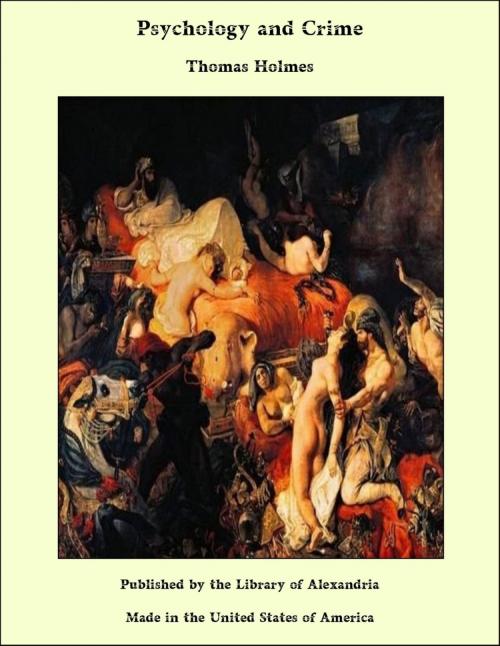| Author: | Thomas Holmes | ISBN: | 9781465618504 |
| Publisher: | Library of Alexandria | Publication: | March 8, 2015 |
| Imprint: | Language: | English |
| Author: | Thomas Holmes |
| ISBN: | 9781465618504 |
| Publisher: | Library of Alexandria |
| Publication: | March 8, 2015 |
| Imprint: | |
| Language: | English |
I hope that no one will be prevented from reading this chapter by its title, for let me say at once that I am not the least bit scientific. Whatever I have to say will be expressed in very simple language, and further, that in the writing of it I am animated with the desire of conveying to thoughtful and non-scientific readers some of the personal causes that lead individuals to commit actions that are deemed criminal. Of the social and industrial causes of crime I shall be silent, for whole volumes have been and can still be written on those subjects, and though to me they are very inviting topics, I must within the compass of this little book ignore them. I shall of course speak “right on” and tell of what I have seen and known during my many years’ experience of London’s criminals. Indeed, I have no other qualification than this: that for twenty-five years I have spent my days in London police courts, and my evenings with discharged prisoners. I may also add to these opportunities for study, frequent visits to prisons, and confidential talks with prisoners. It will, I think, be admitted that I have had privileged opportunities for learning something, but by no means everything, of the characteristics, mentality and personality of law-breakers. Of a certainty, considering the extent of my opportunities, I must have been dull if I had not learned much, or what is perhaps of more importance, unlearned a great deal more about the personal causes of crime. I will therefore draw upon my own experience, feeling quite sure that a non-scientific book, though small in size and free from pretensions, will be a welcome addition to the long list of books that have been written upon this interesting subject. To me it is a most inviting subject, yet it is a singularly dangerous one; for when any one undertakes to explain the working of another man’s mind, and to give reasons for the other man’s actions, he assumes a knowledge that he cannot possess, though he may honestly believe that he possesses it. In reality he makes statements that cannot be proved, but they are statements that cannot be disproved. The list of scientific books on this subject is a long one, indeed it is almost interminable. Many of these books are voluminous in size and terrifying in title. Some of these, written by men of eminence, have their uses, and may be considered standard works. Neither can there be the slightest doubt that the accumulated experience, research or opinions of thinking men have, and have very rightly, a title to serious consideration.
I hope that no one will be prevented from reading this chapter by its title, for let me say at once that I am not the least bit scientific. Whatever I have to say will be expressed in very simple language, and further, that in the writing of it I am animated with the desire of conveying to thoughtful and non-scientific readers some of the personal causes that lead individuals to commit actions that are deemed criminal. Of the social and industrial causes of crime I shall be silent, for whole volumes have been and can still be written on those subjects, and though to me they are very inviting topics, I must within the compass of this little book ignore them. I shall of course speak “right on” and tell of what I have seen and known during my many years’ experience of London’s criminals. Indeed, I have no other qualification than this: that for twenty-five years I have spent my days in London police courts, and my evenings with discharged prisoners. I may also add to these opportunities for study, frequent visits to prisons, and confidential talks with prisoners. It will, I think, be admitted that I have had privileged opportunities for learning something, but by no means everything, of the characteristics, mentality and personality of law-breakers. Of a certainty, considering the extent of my opportunities, I must have been dull if I had not learned much, or what is perhaps of more importance, unlearned a great deal more about the personal causes of crime. I will therefore draw upon my own experience, feeling quite sure that a non-scientific book, though small in size and free from pretensions, will be a welcome addition to the long list of books that have been written upon this interesting subject. To me it is a most inviting subject, yet it is a singularly dangerous one; for when any one undertakes to explain the working of another man’s mind, and to give reasons for the other man’s actions, he assumes a knowledge that he cannot possess, though he may honestly believe that he possesses it. In reality he makes statements that cannot be proved, but they are statements that cannot be disproved. The list of scientific books on this subject is a long one, indeed it is almost interminable. Many of these books are voluminous in size and terrifying in title. Some of these, written by men of eminence, have their uses, and may be considered standard works. Neither can there be the slightest doubt that the accumulated experience, research or opinions of thinking men have, and have very rightly, a title to serious consideration.















